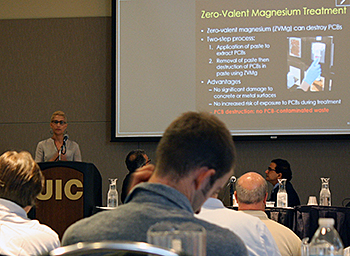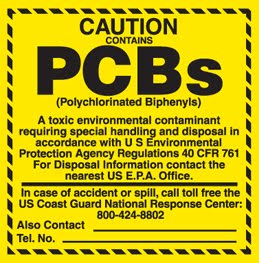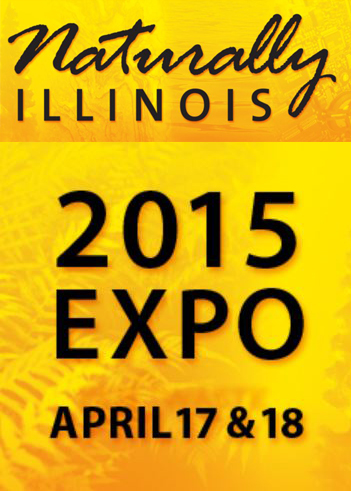Happy America Recycles Day! Celebrated annually on November 15 since 1997, America Recycles Day is a program of Keep America Beautiful, Inc. and is about educating the public about how and what to recycle, while encouraging people to do so as part of their daily routine. Those of us who were alive in the 1970s will remember Keep America Beautiful, or KAB, as the folks who brought us the public service campaign involving a Native American man weeping while bearing witness to thoughtless pollution. (You can watch a clip of that famous public service announcement featuring Iron Eyes Cody, and read more about KAB’s history on the organization’s web site.) As a child in the 70s, I suppose those PSAs, along with learning from Woodsy Owl to “Give a Hoot” and not pollute, marked the beginning of my personal journey to working on environmental protection and promoting pollution prevention and sustainability to businesses and citizens in Illinois and beyond.
ISTC provides a lot of information relevant to America Recycles Day through its various projects and web sites. On the Sustainable Electronics Initiative web site, you’ll find a fact sheet on Electronics Take-Back and Donation Programs that will help you learn about recycling options, or if you’re interested in selling devices for some extra cash or donating your electronics for a good cause. SEI also provides an extensive Summary of U.S. State Laws on Electronic Waste and Disposal Bans so you can learn what laws, if any, apply in your area. The Law & Policy section of the SEI web site will also help you learn about regulations on the local, federal and international levels, as well as providing more information on voluntary initiatives. The SEI Resources section also provides links on various aspects of electronics recycling. Read about the existing Certification programs on the SEI site to learn about what is involved in the responsible recycling of electronic devices. SEI also provides a RefWorks Database of journal articles on sustainable electronics and e-waste, which includes downloadable citations. And SEI’s International E-Waste Design Competition provides inspiration for the recycling and reuse of electronics scrap, as well as greener electronic product design, through a contest open to current university students and recent graduates from around the globe.
On the Great Lakes Regional Pollution Prevention Roundtable (GLRPPR) web site, the extensive Sector Resources section provides information on Recycling & Waste Exchange, Product Stewardship, Environmentally Preferable Purchasing (if you’re interested in products with recycled content among other considerations), Electronic Waste, and Sustainable Product Design (again, relevant to items incorporating recycled materials or those that were designed with recycling in mind). Construction & Demolition provides information on recycling wastes associated with those activities. In the Topic Hubs section of the site, you’ll find a resource on Industrial Composting developed by the Pollution Prevention Resource Exchange (P2Rx). The GLRPPR Funding Opportunities page provides information on grants to support sustainability activities including recycling. For example, the IL DCEO’s Recycling Grants Program provides technical assistance and grants for capital equipment to governmental entities, private businesses, and not-for-profit organizations for projects involving paper, plastic, metal and glass; the deadline for that program is November 19.
ISTC’s Librarian and GLRPPR Executive Director, Laura Barnes, has developed several subject guides for the collection of such guides on the Prairie Research Institute Library web site. The guides on Battery Recycling and Lamp Recycling and Disposal are excellent resources to consult on America Recycles Day as you learn more about what you can do to recycle more items in your day to day life.
So even though recycling may seem like a simple concept that you’ve heard lots about, take some time today to consider all the ways you can incorporate recycling into your work and personal life. Odds are, there’s room for improvement, and every little bit helps!



 In the gaming world, a player caught cheating, using derogatory language, or other equally bad behavior will be “permabanned” or permanently banned from using the site where the bad behavior occurred. Well, that is exactly what the DeWitt count board did with PCBs (polychlorinated biphenyls) and MGP (manufactured-gas-plant) wastes. On April 23, 2015, the DeWitt county board voted to approve a settlement agreement with the owners of Clinton Landfill (near Clinton, IL) that keeps PCBs and MGP wastes out of the landfill. This ends a 7-year dispute between the landfill owners and groups opposed to PCB disposal there. Two articles from The News-Gazette sum up the happenings
In the gaming world, a player caught cheating, using derogatory language, or other equally bad behavior will be “permabanned” or permanently banned from using the site where the bad behavior occurred. Well, that is exactly what the DeWitt count board did with PCBs (polychlorinated biphenyls) and MGP (manufactured-gas-plant) wastes. On April 23, 2015, the DeWitt county board voted to approve a settlement agreement with the owners of Clinton Landfill (near Clinton, IL) that keeps PCBs and MGP wastes out of the landfill. This ends a 7-year dispute between the landfill owners and groups opposed to PCB disposal there. Two articles from The News-Gazette sum up the happenings 




 The
The